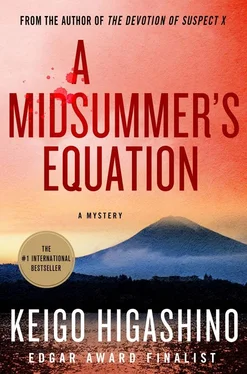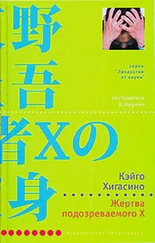“How many years were you at Bar Calvin?” Kusanagi asked.
“Twelve, exactly. They took me on as a bartender when I was in my midthirties. I’d done my time at a few other places before then, but Calvin was the best. Still, I didn’t want to be someone else’s employee the rest of my life, so about ten years ago I left and started this place. I know it don’t look like much, but I’ve done all this without needing to borrow a single yen,” Muroi said, pouring the batter out on the hot plate in front of them. There was a loud sizzle as drops of oil began to dance on the plate.
“I understand Hidetoshi Senba used to be a regular there? Around what time was that?”
Muroi folded his arms across his chest. “I wonder,” he said. “I don’t think I’d been at Calvin a decade around the time he started coming, so I’d say that was about twenty-two, maybe twenty-three years ago?”
“Right,” Kusanagi said, doing some calculations in his head. “So about six or seven years before he was arrested.”
“Yeah, sounds about right. Senba was a big spender back in those days. Had his own company and all. But, after a certain point, he stopped coming altogether, and when I saw him next, well, it was clear he’d fallen on hard times. Cheap clothes, you know the look. That was the night.”
“What about Nobuko Miyake? Was that her first time to Bar Calvin in a while, too?”
“It was, but she hadn’t been away as long as Senba. Maybe only two or three years. Nobuko stopped coming when she quit her hostessing job. She used to bring customers from her place over for drinks at Calvin afterward. Senba was one of ’em.”
“Do you happen to know why she quit?” Kusanagi asked.
Muroi paused to check how the okonomiyaki was coming along before leaning forward in his chair. “Actually, I heard a rumor about that.”
“What kind of rumor?”
“I heard she got fired. Something about her causing trouble.”
“Any idea what that was?”
Muroi chuckled. “Borrowing cash from customers and not paying them back.”
“Yeah, that’d get a hostess sacked.”
“She’d have these lines, like she lost her wallet to a purse-snatcher, or one of her customers had rung up a big tab and gone missing and the restaurant wanted her to pay them back, and she’d borrow ten or twenty thousand yen from her regulars, just a little bit at a time, but it started building up, and customers started complaining.”
“Do you know how she made ends meet after that?”
“Good question. She wasn’t no spring chicken anymore. I figure she had it pretty tough.”
Nobuko Miyake had been forty when she was killed. If Muroi’s story was true, that would make her thirty-seven or thirty-eight when she got fired. If she had a lot of well-heeled regulars to keep her afloat she might have been okay, but without that, it would’ve been hard for her to find work as a hostess again.
“She was never too careful with money, so when I heard about what happened, I wasn’t too surprised. I’m guessing Senba would’ve been a prime target for her little loan scheme.”
“And you’re sure about what you told me earlier?” Kusanagi asked, lowering his voice. “He was really crying?”
Muroi flipped one of the pancakes and said, “It wasn’t just me who saw him. A few of the other guys at the bar were talking about it, wondering why he was so worked up.”
“But you don’t know what they were talking about?”
“Sorry, can’t help you there.” Muroi shook his head and chuckled. “If it was a pretty young girl who was crying, well, I might have gone up and asked what the trouble was, but when a middle-aged man is crying next to a woman, you keep your distance. I thought maybe that’s just what he did when he got drunk, you know.”
A scene began to form in Kusanagi’s mind: a man and woman meeting again for the first time in a long while. The man, a successful businessman who had lost everything, even his wife. The woman, a former hostess who’d reaped what she’d sowed and wound up broke. What could’ve possibly transpired between them that he would’ve cried over their drinks, then run up to her the following day and stabbed her to death?
“What about friends?” Kusanagi asked. “You know anyone close to them? Or maybe another bar they might’ve frequented?”
“Well, not really,” Muroi said, scratching his neck. “It was a long time ago. And we didn’t talk all that much.”
“Right,” Kusanagi said, putting away his notebook in his pocket. It was over twenty years ago, as it was. He hadn’t been expecting Muroi to even remember as much as he had.
“All done — eat up while it’s hot,” Muroi said, spreading some rich, dark sauce on the okonomiyaki before sprinkling it with seaweed and bonito flakes and cutting it on top of the hot plate. “Oh, almost forgot the beer.”
“Can’t drink while I’m on duty, but I’ll definitely help myself to this,” Kusanagi said, breaking off a piece of the pancake with his chopsticks and putting it in his mouth. The surface was nicely browned, but the inside was still soft and moist. He could clearly taste each of the ingredients. “That’s really good,” he said through his first mouthful.
Muroi smiled. “I get a lot of people in here from down south, and they always say I nailed the taste. Okonomiyaki is comfort food down there.” Then his face got more serious, and he said, “Actually, that reminds me.” His eyes got a faraway look in them.
“Yeah?” Kusanagi prompted him.
“No, it’s just,” he began, rubbing his forehead and trying to remember something. “I just remembered them talking a bit about comfort food once.”
“You mean Senba and Nobuko?”
“Yeah. They were talking about the food from back home. They even brought me something once.”
“What was it?”
Muroi folded his arms across his chest and groaned, deep in thought. Finally, he shook his head. “Sorry, I don’t recall.”
“If you remember, could you drop me a line?” Kusanagi asked, writing down his cell phone number on a piece of paper and placing it next to the hot plate.
“Sure thing. But don’t get your hopes up. I can’t see how it’ll help, even if I do remember. Sorry, I probably shouldn’t have said anything.”
“Not at all. You never know what you’re going to find until you start looking.” Kusanagi took another bite of his okonomiyaki, then heard the sound of an e-mail being delivered to his phone. He glanced down at the screen. It was from Utsumi.
He looked at his mail after leaving the restaurant. It read: “Checked Arima Engines. Shigehiro Kawahata was in the records.” He called Utsumi.
“Yes?” she answered.
“Good work. How’d you get access?”
“I went to the main office in Shinjuku and asked someone in HR if I could see their employee records.”
“And they just showed them to you?”
“They had me sign a piece of paper saying that I wouldn’t use them outside of the investigation, and I wouldn’t pass them on to any third party. They wanted me to write the name of my supervising officer, too, so I gave them your name.”
“Fine. If that’s all it took, we got off easy.”
“Also, they really wanted to know what our investigation was about.”
“Please don’t tell me you told them anything,” Kusanagi said, a growl in his voice.
“Of course not.”
“Well, that’s a relief,” Kusanagi said. “So he worked there.”
“Yes, he was a section chief in the technological services division of their Nagoya branch until he left the company fifteen years ago.
“Nagoya? So he wasn’t in Tokyo?”
“That’s what it said in the records. Except, his residential address was in Tokyo.”
Читать дальше












